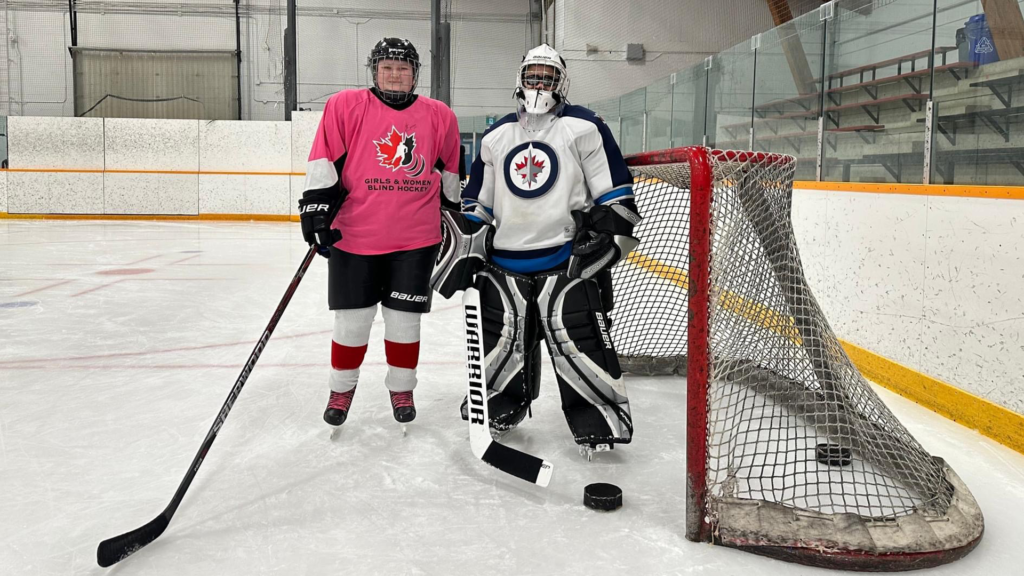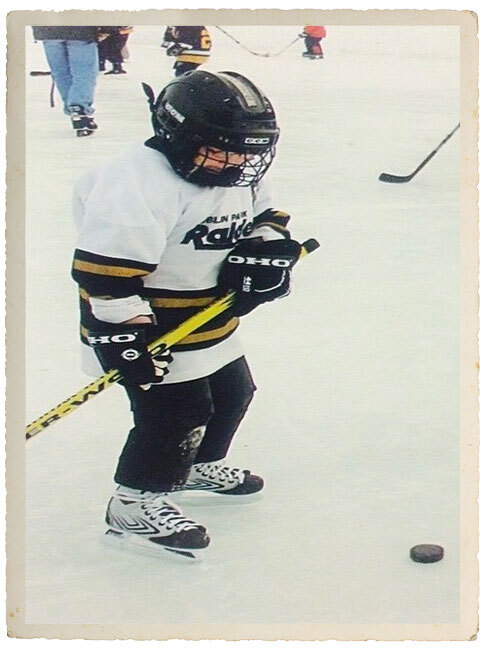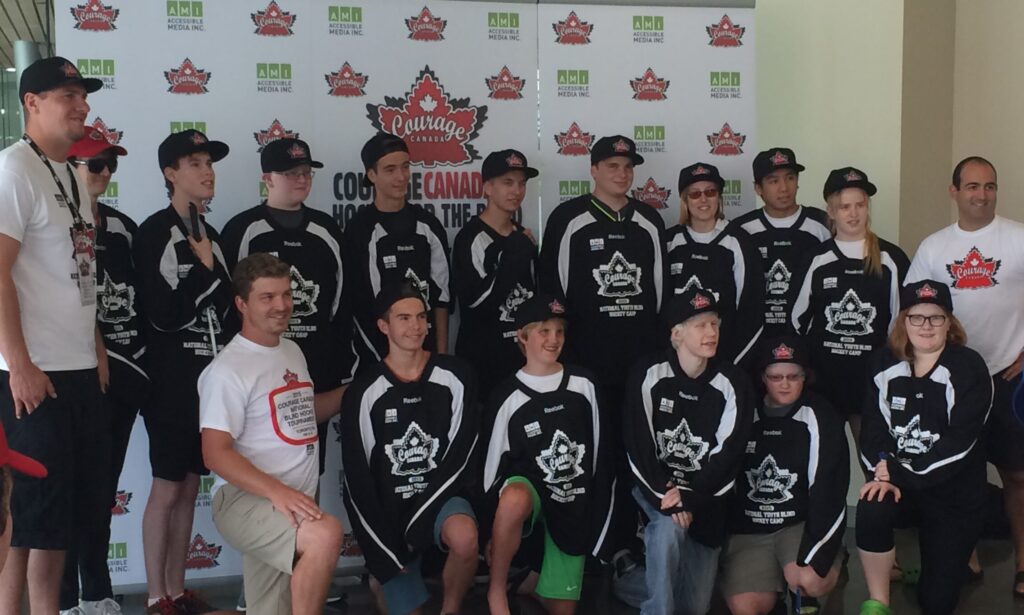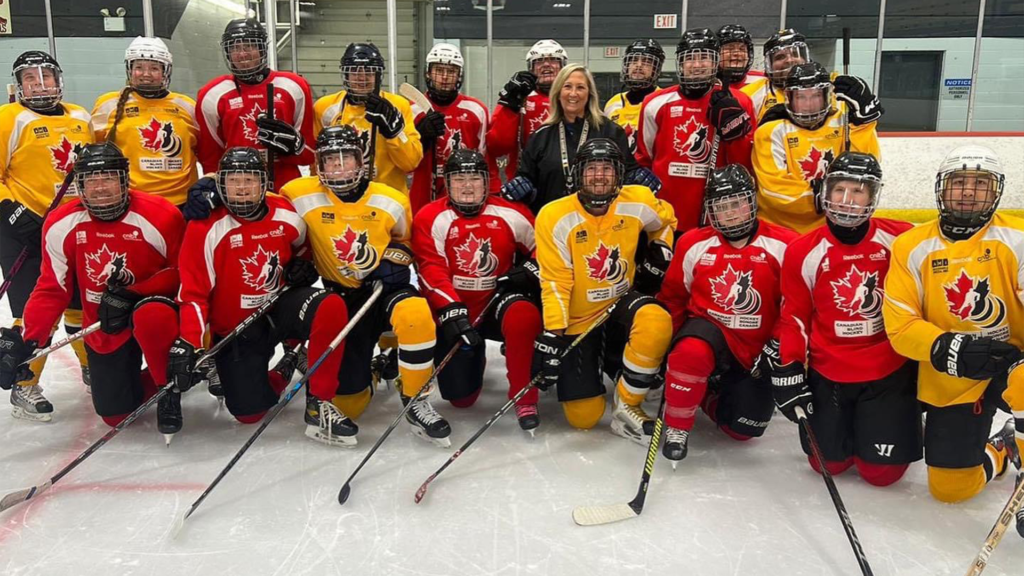I’m a 25 year-old Canadian hockey player with less than 10% vision. That’s right, I am a legally blind hockey player. My love for the game developed at a young age, when I first stepped on the ice, and my continued passion for and practice within the sport is supported by the Canadian Blind Hockey program. Blind Hockey has given me so many experiences to travel, make friendships with people like myself, and has fostered a sense of inclusion and teamwork as some of my core values. It is my hope that sharing my experiences with Canadian Blind Hockey, as one of the first-ever players from Manitoba, will help pave the way to building a team in our province.
My Early Years
My love for hockey started at a young age, when I joined the Jackrabbits hockey program at the Roblin Park Community Centre in Charleswood, Winnipeg from the ages of 7-9 and loved every minute of it. At the time, I had no reason to believe my experience was different than anyone else’s, however, after outgrowing the program, playing hockey became extremely difficult for me.
It seemed that suddenly, I was unable to efficiently track the puck and skate at the speed needed to keep up with the other players. For years I believed my struggles meant my playing skills were subpar, and I would not be able to play hockey well.
When all organized hockey opportunities within Manitoba seemed at the end for me, I was fortunate enough to have a father willing to build and maintain the best backyard rink he possibly could. I would spend hours outside in the wintertime with a stick and puck practicing my skills, and sometimes I was persuasive enough to convince my dad to put his rain boots on and pass the puck to me.
Life with My Diagnosis: Legally Blind
When I was fourteen I was diagnosed as legally blind. Up until that time I was, for the most part, treated as I was sighted with a view that my sight may continue to develop. My diagnosis came as a complete shock to me and everyone around me. I was diagnosed with optic nerve hypoplasia, nystagmus, and a reduced field of vision in my peripheral and upper fields.
Optic nerve hypoplasia is a condition in which the optic nerve is underdeveloped, causing a disconnect between the eyes and brain.
Nystagmus is a condition where one’s eyes move rapidly and uncontrollably.
Reduced peripheral vision affects the ability to see an object beside you, which makes it difficult to orient yourself.
My diagnosis came at such a pivotal age, but the most eye-opening realization came as I was witnessing my sister learn to drive. I had spent my whole life thinking I would eventually gain that sense of independence, but all my hopes disappeared when I learned it was no longer an option. That realization made me wonder if my struggles and inability to succeed at hockey were because of my blindness—and the short answer is yes, they were. Simply growing taller and the games becoming faster as kids grew up and gained experience made it impossible for me to see the puck on the ice, which lead to a temporary pause in my participation in organized hockey.
Getting Back in the Game: Living with My Diagnosis
My diagnosis wasn’t enough for me to give up on my love for hockey—I still had the drive, the passion, but I had to foster my love for the game in a different way. This realization made me strive to became an avid hockey fan. I studied the game by watching the NHL, the Women’s Olympic and World Championships on television, and by focusing on player and game statistics each season. It fuelled my passion for the game, and allowed it to live on inside me.
Blind Hockey Makes its debut in Winnipeg, Manitoba
(April 2015)
In April 2015, a non-profit organization called Courage Canada hosted a Try Blind Hockey/Try Skating Program in Winnipeg, Manitoba. It was put on at Canlan Ice Sports Arena and was the first event of its kind in the province.
Unfortunately, I didn’t get the chance to try Blind Hockey at this event, as I did not know it was happening. The event took place roughly two years after I was diagnosed as legally blind. If not for those two news articles that my mother found, I would never have known about this para/adaptive version of hockey.
When my mother reached out to Courage Canada’s Matt Morrow, who is now the Executive Director of Canadian Blind Hockey, to try and get me the opportunity to try this version of hockey, the organization was very gracious and made it possible for me. They assisted me financially to fly out to Burnaby, British Columbia for a week-long multi-sport camp featuring Blind Hockey, goalball and beep-baseball, giving me the ability to try multiple adapted sports. When I heard about this version of hockey, I didn’t think twice. I celebrated and packed my bags, excited about this new opportunity.
My First Blind Hockey Experience With Courage Canada
(Multi-Sport Camp in Burnaby, British Columbia)
At the age of 17 (2015), I attended the multi-sport camp in Burnaby, and was one of four girls who registered. Having the opportunity to attend this camp gave me many valuable moments, such as meeting new friends with similar visual restrictions and trying multiple para-sports for the first time—beep-baseball, goalball, Blind Hockey and dragon boating.
Stepping out on the ice was nerve-racking for me, as I hadn’t done so since before my diagnosis; however, the moment I heard the puck drop onto the ice, I was instantly transported back to the joy I felt when I was a kid.
Letting Fears and Barriers Take Over
From 2016-2022, I took a step back from Blind Hockey. My distance from the sport occurred for multiple reasons, the most prominent being my transition from high school to university, financial restrictions, and the global pandemic. Ultimately, not having an adapted hockey program in Manitoba was the largest barrier and what kept me from the sport.
Growth Of the Women’s Game: A Historic Event for Women & Girls in Blind Hockey
My return to Blind hockey Came in March 2022, when Canadian Blind Hockey hosted their first-ever Women’s Summit at their national tournament in Toronto, Ontario. Canadian Blind Hockey and the Women and Girls Coordinator, Laura Mark, put on an event to remember. Seeing the growth of the women’s game was an incredible feeling, especially with all the young girls that were registered in the children & youth divisions. I had never experienced so many female para-athletes in one room.
Knowing I made Canadian Blind Hockey history by playing in the first-ever women and girl’s Blind Hockey game and being a part of the first-ever winning team are moments I’ll never forget.
My First National Blind Hockey Tournament
(Toronto, Ontario)
Canadian Blind Hockey hosted their annual National Blind Hockey Tournament on March 25-27th, 2022 at the Mattamy Athletic Centre (Former Maple Leafs Gardens) in Toronto, Ontario. With the Women’s Summit scheduled before the weekend tournament, it gave me the opportunity to take part in both events. Playing in my first tournament in the Low Vision/Development division, I got to learn the game by playing in a four-on-four environment with quality coaches, which was an entirely new experience.
By taking part in this tournament, I got to see all my hard work in the study of hockey pay off as I scored my very first goal in game two in the second period. My team managed to win the division and take the gold medal in the Low Vision/Development division. I was also named best forward in the division that year.
Growing the Game at Home
(Winnipeg, Manitoba)

In June 2023, Hockey Winnipeg and Canadian Blind Hockey teamed up again to put on our fourth Try Blind Hockey Program. It was exciting to have the Blind Hockey puck take the ice in Winnipeg again, this time, with players other than myself in attendance.
After the fourth Try Blind Hockey event, I inquired about finding an inclusive team or class I could play in to help improve my skills. The team who runs the beginner play-to-learn hockey class at Canlan Sports allowed me to participate in the program, and use things such as the adapted puck used in Blind Hockey. This class has offered me an inclusive place to play each week, and I’ve gotten to showcase the adaptive puck to abled-bodied individuals at varying levels.
To the Future: a Dream for a Winnipeg Team
I look forward to the opportunity to travel to Toronto and represent Manitoba in the sport of Blind Hockey at the 3rd-Annual Women’s Summit and my third Canadian National Blind Hockey Tournament this March (2024). After this upcoming tournament, I will have been to a total of 10 different Canadian Blind Hockey events.
I am excited to add to the growth of the game of Blind Hockey and share the opportunity with other visually-impaired individuals in Manitoba. It is my hope that other disabled athletes will find the sport at an integral time in their lives, whether it’s just after a diagnosis, or later down the line. Everyone deserves to have adaptable sports and programming, no matter their disability, and it is my belief that Manitoba (Winnipeg specifically) would benefit from having a full-time Blind Hockey program.
Join Scarlette and other Blind Hockey players from across Canada, the USA, Finland, the UK and more in Toronto from March 22 – 24 at Mattamy Athletic Centre, 50 Carlton street. Full schedule is available at canadianblindhockey.com
__
What is Blind Hockey ?
Blind Hockey is a Para sport played by people who are blind and partially sighted, whose sight ranges from zero, to about 10% percent. Following the traditional game of ice hockey, Blind Hockey keeps many of the same rules with some adaptations such as:
- The puck is 3 times the size and has 8-ball bearings inside to make noise
- A 3-foot net is used instead of a 4-foot net and goalies have to be fully blind or blindfolded
- Players must make a clear pass before they can shoot the puck – that’s the pass whistle!
How Can You Get Involved with Blind Hockey in Winnipeg?
- Email: Manitoba’s Blind Hockey Player Scarlette Dorn: scarlettedorns98@gmail.com
- If you know of someone who could benefit from this para-sport, reach out to them and let them know this sport is out there. Please don’t be afraid to send Scarlette an email.
- To learn more on Canadian Blind Hockey, feel free to check out Canadian Blind Hockey on all their social media platforms (Instagram, X, Facebook, Youtube, etc) and website at: https://canadianblindhockey.com



